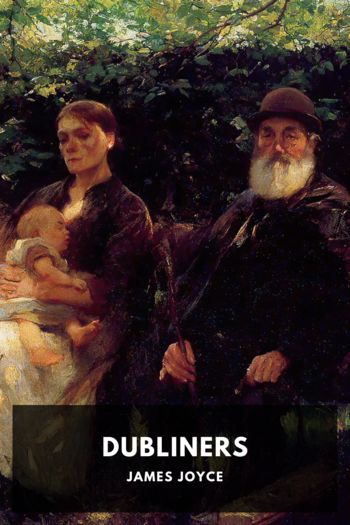Dubliners James Joyce (ebook reader web .TXT) 📖

- Author: James Joyce
Book online «Dubliners James Joyce (ebook reader web .TXT) 📖». Author James Joyce
He went often to her little cottage outside Dublin; often they spent their evenings alone. Little by little, as their thoughts entangled, they spoke of subjects less remote. Her companionship was like a warm soil about an exotic. Many times she allowed the dark to fall upon them, refraining from lighting the lamp. The dark discreet room, their isolation, the music that still vibrated in their ears united them. This union exalted him, wore away the rough edges of his character, emotionalised his mental life. Sometimes he caught himself listening to the sound of his own voice. He thought that in her eyes he would ascend to an angelical stature; and, as he attached the fervent nature of his companion more and more closely to him, he heard the strange impersonal voice which he recognised as his own, insisting on the soul’s incurable loneliness. We cannot give ourselves, it said: we are our own. The end of these discourses was that one night during which she had shown every sign of unusual excitement, Mrs. Sinico caught up his hand passionately and pressed it to her cheek.
Mr. Duffy was very much surprised. Her interpretation of his words disillusioned him. He did not visit her for a week, then he wrote to her asking her to meet him. As he did not wish their last interview to be troubled by the influence of their ruined confessional they met in a little cakeshop near the Parkgate. It was cold autumn weather but in spite of the cold they wandered up and down the roads of the Park for nearly three hours. They agreed to break off their intercourse: every bond, he said, is a bond to sorrow. When they came out of the Park they walked in silence towards the tram; but here she began to tremble so violently that, fearing another collapse on her part, he bade her goodbye quickly and left her. A few days later he received a parcel containing his books and music.
Four years passed. Mr. Duffy returned to his even way of life. His room still bore witness of the orderliness of his mind. Some new pieces of music encumbered the music-stand in the lower room and on his shelves stood two volumes by Nietzsche: Thus Spake Zarathustra and The Gay Science. He wrote seldom in the sheaf of papers which lay in his desk. One of his sentences, written two months after his last interview with Mrs. Sinico, read: Love between man and man is impossible because there must not be sexual intercourse and friendship between man and woman is impossible because there must be sexual intercourse. He kept away from concerts lest he should meet her. His father died; the junior partner of the bank retired. And still every morning he went into the city by tram and every evening walked home from the city after having dined moderately in George’s Street and read the evening paper for dessert.
One evening as he was about to put a morsel of corned beef and cabbage into his mouth his hand stopped. His eyes fixed themselves on a paragraph in the evening paper which he had propped against the water-carafe. He replaced the morsel of food on his plate and read the paragraph attentively. Then he drank a glass of water, pushed his plate to one side, doubled the paper down before him between his elbows and read the paragraph over and over again. The cabbage began to deposit a cold white grease on his plate. The girl came over to him to ask was his dinner not properly cooked. He said it was very good and ate a few mouthfuls of it with difficulty. Then he paid his bill and went out.
He walked along quickly through the November twilight, his stout hazel stick striking the ground regularly, the fringe of the buff Mail peeping out of a side-pocket of his tight reefer overcoat. On the lonely road which leads from the Parkgate to Chapelizod he slackened his pace. His stick struck the ground less emphatically and his breath, issuing irregularly, almost with a sighing sound, condensed in the wintry air. When he reached his house he went up at once to his bedroom and, taking the paper from his pocket, read the paragraph again by the failing light of the window. He read it not aloud, but moving his lips as a priest does when he reads the prayers Secreto. This was the paragraph:
Death of a Lady at Sydney Parade
A Painful Case
Today at the City of Dublin Hospital the Deputy Coroner (in the absence of Mr. Leverett) held an inquest on the body of Mrs. Emily Sinico, aged forty-three years, who was killed at Sydney Parade Station yesterday evening. The evidence showed that the deceased lady, while attempting to cross the line, was knocked down by the engine of the ten o’clock slow train from Kingstown, thereby sustaining injuries of the head and right side which led to her death.
James Lennon, driver of the engine, stated that he had been in the employment of the railway company for fifteen years. On hearing the guard’s whistle he set the train in motion and a second or two afterwards brought it to rest in response to loud cries. The train was going slowly.
P. Dunne, railway porter, stated that as the train was about to start he observed a woman attempting to cross the lines. He ran towards her and shouted, but, before he could reach her, she was caught by the buffer of the engine and fell to the ground.
A juror. “You saw the lady fall?”
Witness. “Yes.”
Police Sergeant Croly deposed that when he arrived he found the deceased lying on the platform apparently dead. He had the





Comments (0)